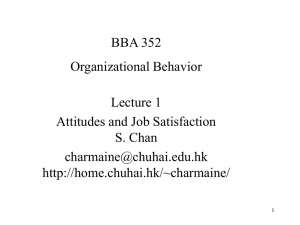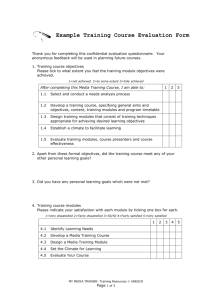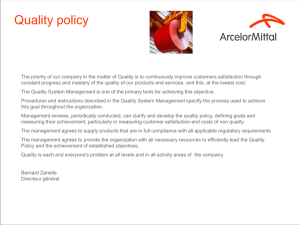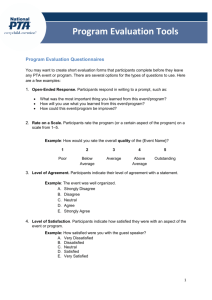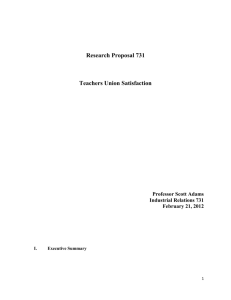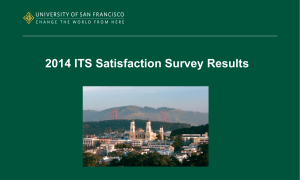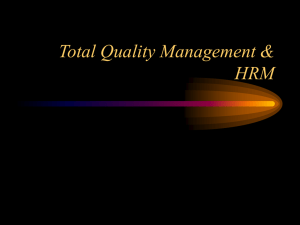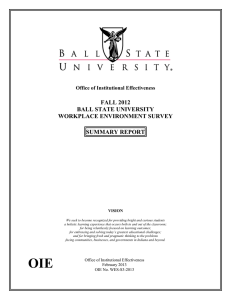Training Session Satisfaction Survey
advertisement
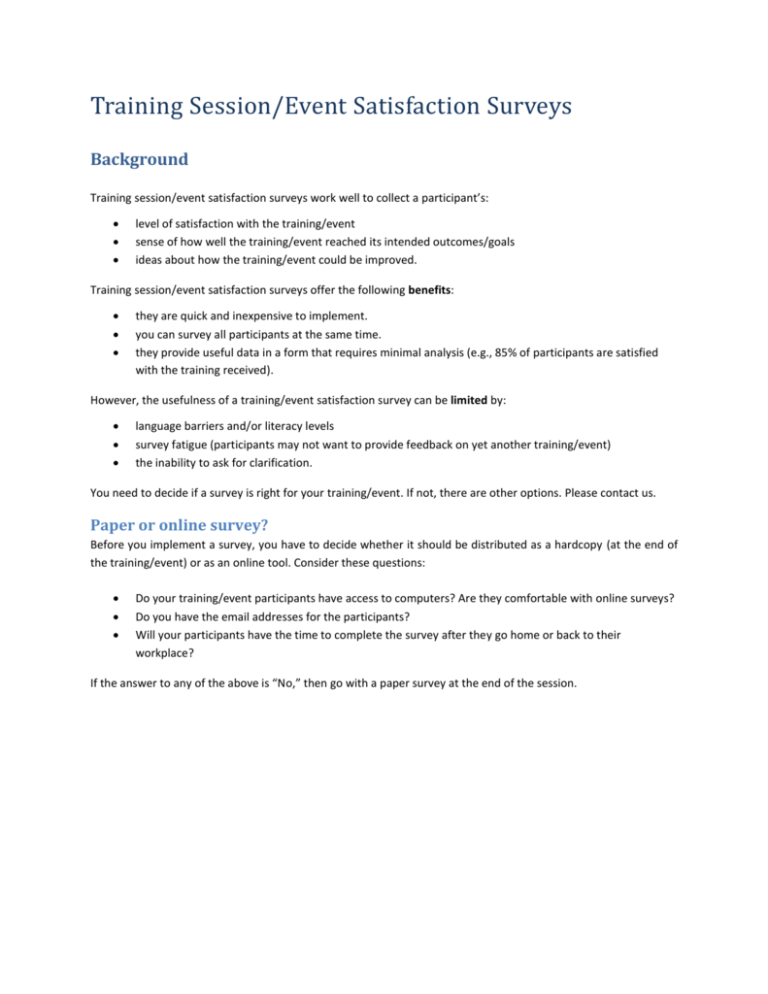
Training Session/Event Satisfaction Surveys Background Training session/event satisfaction surveys work well to collect a participant’s: level of satisfaction with the training/event sense of how well the training/event reached its intended outcomes/goals ideas about how the training/event could be improved. Training session/event satisfaction surveys offer the following benefits: they are quick and inexpensive to implement. you can survey all participants at the same time. they provide useful data in a form that requires minimal analysis (e.g., 85% of participants are satisfied with the training received). However, the usefulness of a training/event satisfaction survey can be limited by: language barriers and/or literacy levels survey fatigue (participants may not want to provide feedback on yet another training/event) the inability to ask for clarification. You need to decide if a survey is right for your training/event. If not, there are other options. Please contact us. Paper or online survey? Before you implement a survey, you have to decide whether it should be distributed as a hardcopy (at the end of the training/event) or as an online tool. Consider these questions: Do your training/event participants have access to computers? Are they comfortable with online surveys? Do you have the email addresses for the participants? Will your participants have the time to complete the survey after they go home or back to their workplace? If the answer to any of the above is “No,” then go with a paper survey at the end of the session. Sample Training Session/Event Survey Instructions - Before You Begin If you need technical support in using online surveys, including advice on how to incorporate a prize ballot, please fill out an evaluation request form on the OHTN’s EBPU page: http://www.ohtn.on.ca/evidence-based-practice-unit/ If the survey is being used to assess a specific event/training (e.g., annual forum), the contact person for the survey should not be the person running that event/training. Instead, use the Executive Director or other Program Manager as the contact. We’ve provided a few ideas about how to use survey findings. Do what works best for your agency – the main idea is to let participants know that findings will be used. This survey contains examples of training/events that different agencies might offer. Please adjust the survey to reflect your agency’s activity. If you do not have pre-set choices for a question (e.g. “Select the ways in which we can improve the training”), then make the question open-ended (e.g. “How can we improve the training?”). The survey contains examples of a full range of questions that you could ask about a training session/event. You do not need to use all of these questions. Choose the questions that work best for your training session/event and that fit with the purpose of your evaluation. The questions should align with the training provided, the learning objectives of the sessions and their respective agency/program context. SHAMROCK HEALTH SERVICES – TRAINING SESSION/EVENT SATISFACTION SURVEY Thank you for attending [session/event name] on [xxxx]. Your experience at the training is very important to us as we continue to look for ways to improve our capacitybuilding activities. The purpose of this survey is to help us determine the extent to which the training met its goals and to identify ways to improve future training events. We invite you take a few minutes to complete this short survey and provide your feedback. The survey should take less than [xxx] minutes. Your participation is voluntary, anonymous and confidential (we do not ask for your name). We will use the findings to improve future trainings. If you have any questions or concerns about the evaluation, please contact: This Person ###-###-#### x### This.Person@earthling.com [IF USING ONLINE QUESTIONNAIRE] - Click “Next” to indicate your agreement to continue with the survey. Thank you! PART A: Overall Experience 1. Rate your overall level of satisfaction with the [insert training event]. Very satisfied Satisfied Neutral (you may choose to remove this option) Dissatisfied Very dissatisfied If this is an annual event and you would like to know how it compares to past events you can ask something such as: 2. Overall, how did this year’s [event] compare to last year (xxxx)? Better than last year Just as good as last year Not as good as last year I did not attend last year The following are additional questions regarding attendance at previous trainings. These are useful for repeat training sessions (e.g., semi-annual face-to-face meetings or bimonthly webinars, etc.) with the same participants. 3. Did you attend the [date/ year] [previous event]? Yes No 4. If you attended last [month’s/ year’s, etc.] [event], please describe how you applied what you learned (if applicable). If you were not able to apply any skills or knowledge gained, please tell us about it so we can improve future training sessions. NOTES: PRO – this type of question leaves it completely open and up to the participant to tell you what they did or did not do. CON – this requires more analysis (time, effort) from the staff person but may provide a better indication of what participants find useful and take away from training. OR consider a question such as … 5. Please tell us how (if at all) you applied what you learned at last [month’s/year’s, etc.] [event]. Please check all that apply. I revised my outreach activities I used a new approach to engage mental health service providers I used the policy development toolkit with service providers in my area I helped a service provider develop trans inclusive policies I delivered the standard women and HIV presentation to service providers who work with women in my community I made connections with new service providers in my community Other, please explain _________________________________________________________________ I did not take away concrete information that I could use in my work, I would have liked to receive: ___________________________________ NOTE: The response options should link to the intended outcomes of the training sessions/events. PRO – easier to analyze and count the number of times each option is chosen CON – it needs to relate to what was provided in the training and the choices must make sense in that training context. This also makes it easier for people to just check off items and can limit the depth of information you receive. PART B: [Event] Outcomes NOTE: These items should be agency specific and relate to the learning goals or intended objectives of the training event. (E.g., Was it focused on increasing knowledge, skills, raising awareness, etc.) 6. Please indicate your level of agreement with the following statements: Strongly Agree Neutral Disagree NB: These items should relate to agree overall goals of the training as a whole. Remove ‘neutral’ if you don’t want to use it. The training helped build my capacity to respond to the needs of [target population] The training increased my knowledge of xxxx. The training increased my understanding about the key issues related to working with [xxx]. Etc. Strongly disagree Workshop Outcomes 7. Please indicate your level of agreement with the following statements Strongly Agree Neutral Disagree NB: These items should relate to agree the specific learning outcomes from the presentations, sessions, workshops, etc. Remove ‘neutral’ if you don’t want to use it. The session increased my knowledge of the link between gay men’s sexual and mental health The training improved my presentation skills The training identified key messages about [PrEP and PEP] that I can use in my work Etc. Strongly disagree 8. If applicable, please share two main take home messages that you learned through your participation at the [event]. Key Learning #1: Key Learning #2: 9. If applicable, please tell us how you plan to use what you learned at the [event]. If the information presented is not applicable to your local context, please tell us how we can improve this for the future/have made it more applicable for you. ________________________________________________________________________ _______________________________________________________________________ OR One action (next step) I will take after attending the [training/event] is: ________________________________________________________________________ ________________________________________________________________________ OR Please identify which of the following actions (if any) you intend to take / how you plan to use what you learned at the [training/event]. Please check all that apply (if any). I will use the presentation tips I learned in my next presentation I will use the online outreach tips that were suggested I will adapt my approach for reaching gay men in my community Etc. NOTE: These must relate to the purpose of the training session and the skills/ideas that were discussed. PART C: Meeting Structure 10. Satisfaction with [Training/Meeting] Logistics Rate your level of satisfaction with the following meeting logistics: Meeting Logistics Note: you can choose Very to use or remove the satisfied ‘neutral’ option Level of Satisfaction Satisfied Neutral Dissatisfied Very dissatisfied Not applicable The venue (meeting rooms) Food/beverages Hotel accommodations Travel arrangements process Registration process Location 11. Satisfaction with [Training/Meeting] Structure Rate your level of satisfaction with the structure of the [event]: Structural Components of the [Meeting] Note: you can choose Very to use or remove the satisfied ‘neutral’ option The agenda format (presentations, concurrent sessions, …) Facilitation Networking time Time for questions Schedule (timing of sessions, etc.) Take home resources Skills training sessions Level of Satisfaction Satisfied Neutral Dissatisfied Very Not dissatisfied applicable Structural Components of the [Meeting] Note: you can choose Very to use or remove the satisfied ‘neutral’ option Key note presentations Small group sessions/workshops Level of Satisfaction Satisfied Neutral Dissatisfied Very Not dissatisfied applicable Please comment on the components above: ______________________________________________________________________________ ______________________________________________________________________________ ____________________________________________________________ PART D: Suggestions for Improvement 12. How can we improve the [event]? Please share your ideas about items that were missing, additional items that you would like to see, and how the sessions could have been improved. ______________________________________________________________________________ ______________________________________________________________________________ ______________________________________________________________________________ _____________________________________________________________________________ 13. What types of support would help you carry out your role? Consider training (information and skills-based) and resources needed. ______________________________________________________________________________ ______________________________________________________________________________ ______________________________________________________________________________ ____________________________________________________________________________ 14. Please share any additional comments about the [event]. ______________________________________________________________________________ ______________________________________________________________________________ ______________________________________________________________________________ ____________________________________________________________________________ Thank you for taking the time to provide your feedback on the [training session/event]!
